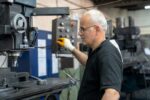Unlocking productivity: The National Launch of the 35 by 35 Business Performance Programme
New Zealand’s productivity challenge is well documented — but what if lifting performance across small and medium-sized businesses could be systemised, measured, and accelerated at scale? That is the ambition behind 35 by 35, a national business performance movement designed to help New Zealand businesses lift productivity, capability, and resilience by 35 percent by 2035. Taking Hutt Valley Chamber of Commerce’s concept, The Better SMB is amplifying 35 by 35 to a national programme. At its core is a simple idea: high performance should not be left to chance, personality, or luck — it should be measurable, repeatable, and accessible. The national launch by The Better SMB of its flagship performance intelligence tool, PerformIQ, marks a significant step toward turning that ambition into action. From aspiration to evidence-based uplift For too long, business support has relied on fragmented advice, disconnected programmes, and anecdotal outcomes. PerformIQ changes that by introducing a shared measurement system — a practical diagnostic that establishes clear baselines across business performance, leadership maturity, and operational foundations. Businesses can finally answer the question: Where are we actually strong — and where are we exposed? More importantly, they can see how they compare to similar businesses and track improvement over time. This shift from opinion to evidence is what unlocks productivity gains. When leaders have clarity, they can prioritise the right actions, invest with confidence, and move faster. A national programme, grounded in regions The rollout of PerformIQ begins with the Hutt Valley Chamber of Commerce, followed by the North West Country Business Association, before expanding nationally through chambers and regional business organisations. This partner‑led model ensures the programme strengthens local ecosystems rather than bypassing them. Businesses are guided toward chamber‑approved, local providers first, reinforcing regional capability and keeping investment close to home. At a regional level, anonymised and […]










